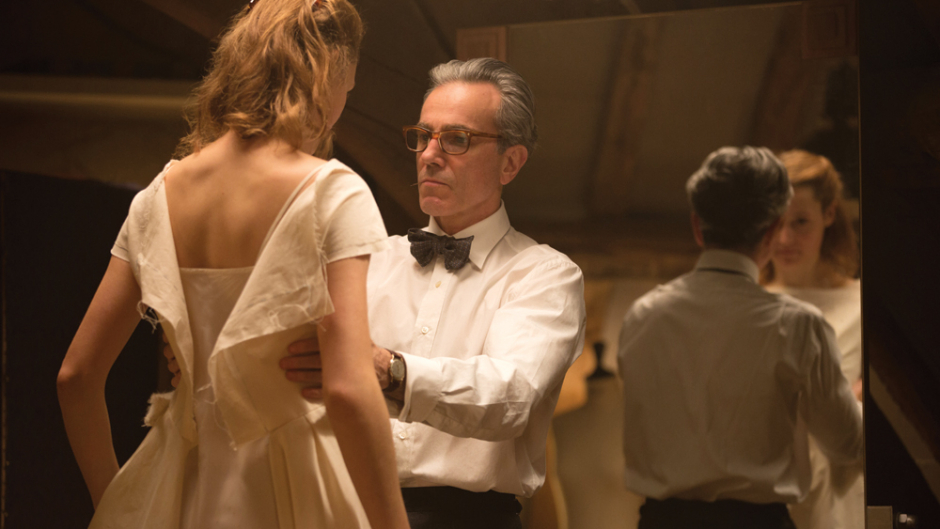I entered the world of Phantom Thread on very scant details and I would recommend the same approach for everyone else. Despite it’s subject matter, this is a film with no bluster or pretensions; it simply wants to pin you in place and tell you its story while it soaks you in its variations of tension, desire and humour. If you allow him, director Paul Thomas Anderson will enclose you, deliberately and delicately – but not without a certain menace – into this particular universe and hold you still while it fits the drama around your mind.
The universe is the haute couture of 1950s London, in the house of master dressmaker and proud bachelor Reynolds Woodcock (Daniel Day-Lewis, in his final screen role before retirement). He is aging, but with the self-assured grace that comes of his privilege; he is exquisitely talented, and rich, and he knows it. His every waking moment is devoted to the art of his craft, and he is never more content than when he sweeps around a model, a pin between his teeth, calling out measurements and seeking just the right tuck, just the right lift. Day-Lewis mesmerises throughout, playing Woodcock like a combination of Boris Lermontov from The Red Shoes (1948) and Ian Fleming. He is fastidious and obsessed with his art, but equally particular about his food and routine, and yet he is never in complete control of his desires and that scrapes at him, like a knife across dry toast.
We meet him at the breakfast table as he inks new designs into his ubiquitous notebook, refusing to engage with his latest beau. Angered, she offers him confrontation, something he simply does not have time for, and she is soon dispatched from his world; she no longer fits like she used to. The empire of Woodcock can be shared by a romantic partner, but must not be disrupted. He turns to his sister Cyril (a chilling Leslie Manville), his business partner and constant presence, who serves as the ice-cold check to any inflammation of his desires. It is her role to dismiss the women in his life who have worn him down. He soon seeks a replacement and finds one; a blushing waitress in an English bed and breakfast who is wooed by his effortless charm. This is Alma, played with compelling energy by little-known Luxembourgian actor Vicky Krieps. She is taken in by Woodcock, by his handsome charm and his eccentric breakfast order, and later by his promise of couture and wealth. But she is not the easy catch Woodcock may think she is. She will give as much as she gets, she will match his defiance, she will stitch herself into his world and refuse to fray.
This moment however – the meeting of the two leads – was the only mis-stitch of the film for me. While the scripting was perfection, as it is throughout, the idea that a suave, silver-haired gentleman can rock up to a rural hotel and sweep away a young and impressionable waitress feels a little too much like the ultimate wet dream of an aging artist. Of Anderson and Day-Lewis, perhaps, who collaborated closely on the script (even though the latter goes uncredited for the writing). I squirmed a little as she entered his car and was whipped away, laughing and falling head over heels. A different story, and this might have been her grisly doom. Written by a woman, the headstrong and self-assured Alma may not have been such an easy catch in the first place.
Nevertheless, the situation she enters into is anything but comfortable. She is incompatible with Woodcock, as all women are, and she cannot move him to think differently without resorting to nasty means. Without going too far into plot details, the drama slowly spirals into fairy tale territory – not in the sense of magic and talking animals, but into the darkness of deeds done for love, of control and desire, of powers found in the forest. And from there, everything and anything becomes possible and the threads come thrillingly loose.
Phantom Thread will not quite get the attention given to it’s fellow Best Picture contenders, nor the high accolades given to the classic Anderson/Day-Lewis collaboration There Will be Blood (2007), but it more than deserves adoration. It is a masterfully crafted story, a tale of art versus love as old as time, but refreshingly realised. A particularly enthusiastic nod must be given to Radiohead’s Jonny Greenwood for his astonishing score; a lush, full sweep of melodrama which rarely leaves our ears and masterfully embodies the glamour and peculiar terror of Woodcock and his dresses. It is a remarkable composition that more than deserves the Best Score gong on March 4th.
As with much of Anderson’s work, this is cinema at its most compelling, its most exquisite. It has a classic feel, a modern Powell and Pressburger, but with a contemporary relish and a bravery to take surprising turns into strangeness and darkness, but also into lightness and humour. It is not a film which wants to set you at ease, because it knows that the high notes of life are not struck that way. Like Woodcock, it chases a perfection that will always elude, but it delights in this deception. It knows that stitches are destined to unravel.
by David Hartley

